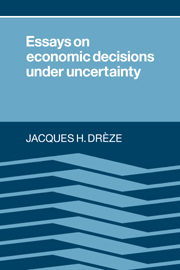Book contents
- Frontmatter
- Contents
- Acknowledgements
- Foreword
- I Decision-making under uncertainty: general theory
- 1 Axiomatic theories of choice, cardinal utility and subjective probability: a review
- 2 Decision theory with moral hazard and statedependent preferences
- 3 Logical foundations of cardinal utility and subjective probability
- 4 A paradox in information theory
- 5 Inferring risk tolerance from deductibles in insurance contracts
- II Markets and prices
- III Consumer decisions
- IV Producer decisions
- V Theory of the firm
- IV Human capital and labour contracts
- VII Public decisions
- Index
2 - Decision theory with moral hazard and statedependent preferences
Published online by Cambridge University Press: 01 October 2009
- Frontmatter
- Contents
- Acknowledgements
- Foreword
- I Decision-making under uncertainty: general theory
- 1 Axiomatic theories of choice, cardinal utility and subjective probability: a review
- 2 Decision theory with moral hazard and statedependent preferences
- 3 Logical foundations of cardinal utility and subjective probability
- 4 A paradox in information theory
- 5 Inferring risk tolerance from deductibles in insurance contracts
- II Markets and prices
- III Consumer decisions
- IV Producer decisions
- V Theory of the firm
- IV Human capital and labour contracts
- VII Public decisions
- Index
Summary
Introduction
Scope and example
In the theory of utility, as presented in modern terms by von Neumann and Morgenstern (1947) and their followers, one starts from a set of prizes, say the finite set B with elements bq, q = 1,…, t. One then defines probability mixtures of prizes, by means of numerical probability vectors β on B, and observes the preferences of a decision-maker among such probability mixtures. When these preferences satisfy three simple axioms (complete order, independence and continuity – see Section 3 below), there exists a real-valued function u on B, called utility, such that preferences among probability mixtures of prizes are isomorphic with expected utilities. That is, the mixture β is preferred to the mixture if and only if
In the theory of games against nature, as presented in modern terms by Savage (1954) and his followers, one starts from a set of alternative, mutually exclusive states of the world, say the finite set S with elements s1,…, sn. Using, as before, a set B of prizes (‘consequences’), acts f, f′,…, are defined as mappings of S into B – that is, as state distributions of prizes (instead of the probability distributions of prizes considered in utility theory). One then observes the preferences of a decision-maker among acts.
- Type
- Chapter
- Information
- Essays on Economic Decisions under Uncertainty , pp. 23 - 89Publisher: Cambridge University PressPrint publication year: 1987
- 18
- Cited by

